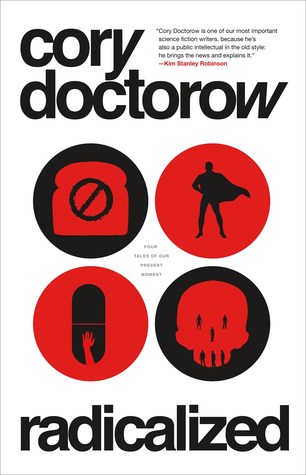 The Bezzle (Martin Hench #2) by Cory Doctorow
The Bezzle (Martin Hench #2) by Cory Doctorow Format: eARC
Source: supplied by publisher via Edelweiss
Formats available: hardcover, paperback, ebook, audiobook
Genres: financial thriller, mystery, thriller
Series: Martin Hench #2
Pages: 240
Published by Tor Books on February 20, 2024
Purchasing Info: Author's Website, Publisher's Website, Amazon, Barnes & Noble, Kobo, Bookshop.org, Better World Books
Goodreads
New York Times bestseller Cory Doctorow's The Bezzle is a high stakes thriller where the lives of the hundreds of thousands of inmates in California’s prisons are traded like stock shares.
The year is 2006. Martin Hench is at the top of his game as a self-employed forensic accountant, a veteran of the long guerrilla war between people who want to hide money, and people who want to find it. He spends his downtime on Catalina Island, where scenic, imported bison wander the bluffs and frozen, reheated fast food burgers cost 25$. Wait, what? When Marty disrupts a seemingly innocuous scheme during a vacation on Catalina Island, he has no idea he’s kicked off a chain of events that will overtake the next decade of his life.
Martin has made his most dangerous mistake trespassed into the playgrounds of the ultra-wealthy and spoiled their fun. To them, money is a tool, a game, and a way to keep score, and they’ve found their newest mark―California’s Department of Corrections. Secure in the knowledge that they’re living behind far too many firewalls of shell companies and investors ever to be identified, they are interested not in the lives they ruin, but only in how much money they can extract from the government and the hundreds of thousands of prisoners they have at their mercy.
A seething rebuke of the privatized prison system that delves deeply into the arcane and baroque financial chicanery involved in the 2008 financial crash, The Bezzle is a sizzling follow-up to Red Team Blues .
My Review:
When we met Martin Hench in the first book in his series, Red Team Blues, the ‘scam’ of the day that Marty needed to unravel – before it unraveled him – was all wrapped in the cryptocurrency shenanigans of its – and our – present day.
I say our present-day because Sam Bankman-Fried’s trial for his cryptocurrency-based fraudulent shenanigans had not yet come to pass when The Bezzle was written, but has between the point when The Bezzle was written and when it is being published next week.
So Red Team Blues was a story about now – or at least now-ish. The Bezzle is a story about then. Particularly the early 2000s, when the scam of the day was yet to be uncovered in the dot com boom that has not yet busted when we go back in time with Marty and whoever he is telling this story to. Which we never do find out and I surely wish we did.
Bezzle is a real term in economics that has never gotten the study it deserves. It’s related to the crime of embezzlement, but isn’t the embezzlement itself. Instead, it’s the time between two events; the commission of the crime and its discovery. It’s a weird sort of net-positive financial limbo, or an even stranger Schrödinger’s cat situation, where both the embezzler and their victim believe they have the money and act accordingly, only for one or the other or both to suffer a rude awakening when the crime is discovered.
Now that I’ve thought about it a bit, the story in The Bezzle is a bezzle within a bezzle in a kind of möbius strip of bezzling that doesn’t so much end as shift into a state of mutually assured destruction. A state that Marty, fortunately for him, is finally able to observe from the outside looking in, instead of either from the inside of a jail cell looking out the way that his friend Scott ends up, or up from six feet under, as the villain of this story certainly intended.
Very much like Red Team Blues, The Bezzle is a story about leverage. Not just in the financial sense, but mostly in the sense of who has power over whom, and how much they are willing to pay to exercise it.
 Escape Rating A: The Bezzle is a LOT of things, all of which are fascinating and make for a compelling read, but absolutely none of which are remotely science fiction, whether it is marketed as such or not. And not that SF readers won’t enjoy The Bezzle, because they certainly will and I absolutely did.
Escape Rating A: The Bezzle is a LOT of things, all of which are fascinating and make for a compelling read, but absolutely none of which are remotely science fiction, whether it is marketed as such or not. And not that SF readers won’t enjoy The Bezzle, because they certainly will and I absolutely did.
On the surface, The Bezzle is a combination of 2000 aughts’ nostalgia, a metric buttload of social commentary about the state of the State of California and its seemingly deliberately FUBAR’d penal system, some surprisingly deep analysis of the socio-economic conditions in Steven Brust’s Vlad Taltos series, all wrapped inside a crunchy thriller coating, making it a tasty read from beginning to end.
It starts out deceptively simple, in what looks like a small time con on an equally small island. It’s even a bit silly, as no one in their right mind would think that trading in hamburgers could bring down an entire island’s economy. At least not until Marty Hench figures out that cornering the underground fast-food market on Santa Catalina Island – where fast food franchises were illegal – is more than just a small scale attempt to make a few bucks off the local craving for forbidden fruit. It’s the public front for a Ponzi scheme that is going to bankrupt the local economy. At least until Marty gives the intended suckers some hints about leverage.
And puts a price on the heads of both Marty and the friend who brought him to Catalina in the first place.
From there, the story is off to the races. And it continues racing at a breakneck pace, even through places that might bring other stories and other writers to a screeching halt – but instead detail the long and painful process of bringing a villain to his knees while still exposing and eviscerating the system that made his villainy possible.
What makes the whole thing fly – and it absolutely does fly by – is the charm of its storyteller, Martin Hench himself. Because Marty is really, really good at three things; figuring out which way the books have been cooked, making friends, and storytelling. If you are drawn in by Marty’s world-weary, wry, sarcastic but ultimately caring voice, he’ll carry you through this trip down his memory lane. And if you enjoy caper stories, Marty is a terrific companion for this madcap thrill-ride of a tale.
If Marty manages to dig another story of good friends, filthy lucre, and tech wizards behaving badly out of his capacious memory, this reader will definitely be there for it!

 The Lost Cause by
The Lost Cause by  Red Team Blues (Martin Hench) by
Red Team Blues (Martin Hench) by  Radicalized by
Radicalized by